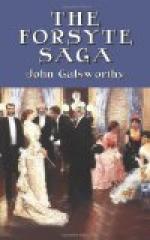Imagine a cross between a pickle and a Forsyte and you have young Publius Valerius Dartie. A youth so named could hardly turn out otherwise. When he was born, Winifred, in the heyday of spirits, and the craving for distinction, had determined that her children should have names such as no others had ever had. (It was a mercy—she felt now—that she had just not named Imogen Thisbe.) But it was to George Forsyte, always a wag, that Val’s christening was due. It so happened that Dartie, dining with him a week after the birth of his son and heir, had mentioned this aspiration of Winifred’s.
“Call him Cato,” said George, “it’ll be damned piquant!” He had just won a tenner on a horse of that name.
“Cato!” Dartie had replied—they were a little ‘on’ as the phrase was even in those days—“it’s not a Christian name.”
“Halo you!” George called to a waiter in knee breeches. “Bring me the Encyc’pedia Brit. from the Library, letter C.”
The waiter brought it.
“Here you are!” said George, pointing with his cigar: “Cato Publius Valerius by Virgil out of Lydia. That’s what you want. Publius Valerius is Christian enough.”
Dartie, on arriving home, had informed Winifred. She had been charmed. It was so ‘chic.’ And Publius Valerius became the baby’s name, though it afterwards transpired that they had got hold of the inferior Cato. In 1890, however, when little Publius was nearly ten, the word ‘chic’ went out of fashion, and sobriety came in; Winifred began to have doubts. They were confirmed by little Publius himself who returned from his first term at school complaining that life was a burden to him—they called him Pubby. Winifred—a woman of real decision—promptly changed his school and his name to Val, the Publius being dropped even as an initial.
At nineteen he was a limber, freckled youth with a wide mouth, light eyes, long dark lashes; a rather charming smile, considerable knowledge of what he should not know, and no experience of what he ought to do. Few boys had more narrowly escaped being expelled—the engaging rascal. After kissing his mother and pinching Imogen, he ran upstairs three at a time, and came down four, dressed for dinner. He was awfully sorry, but his ‘trainer,’ who had come up too, had asked him to dine at the Oxford and Cambridge; it wouldn’t do to miss—the old chap would be hurt. Winifred let him go with an unhappy pride. She had wanted him at home, but it was very nice to know that his tutor was so fond of him. He went out with a wink at Imogen, saying: “I say, Mother, could I have two plover’s eggs when I come in?—cook’s got some. They top up so jolly well. Oh! and look here—have you any money?—I had to borrow a fiver from old Snobby.”
Winifred, looking at him with fond shrewdness, answered:
“My dear, you are naughty about money. But you shouldn’t pay him to-night, anyway; you’re his guest. How nice and slim he looked in his white waistcoat, and his dark thick lashes!”




